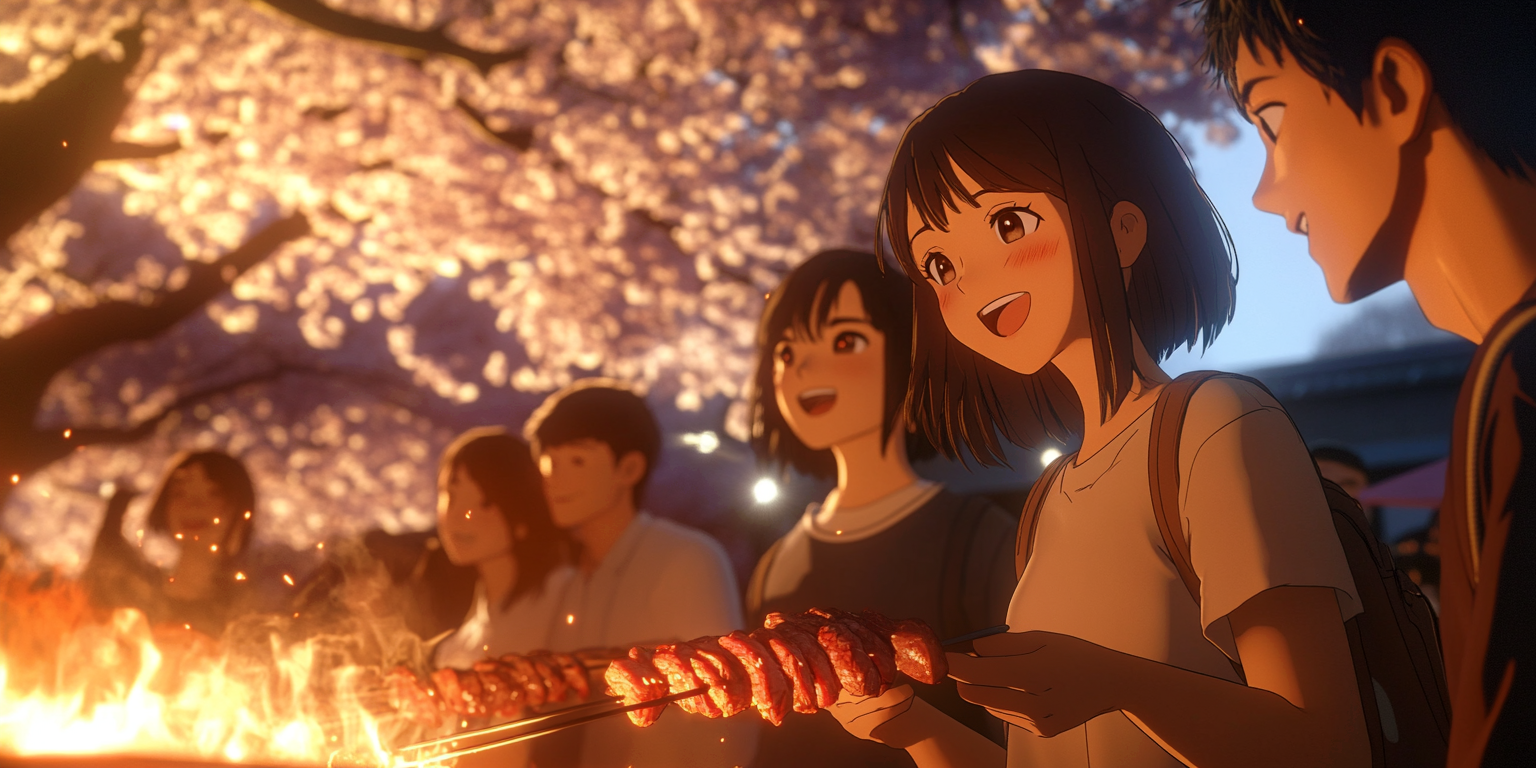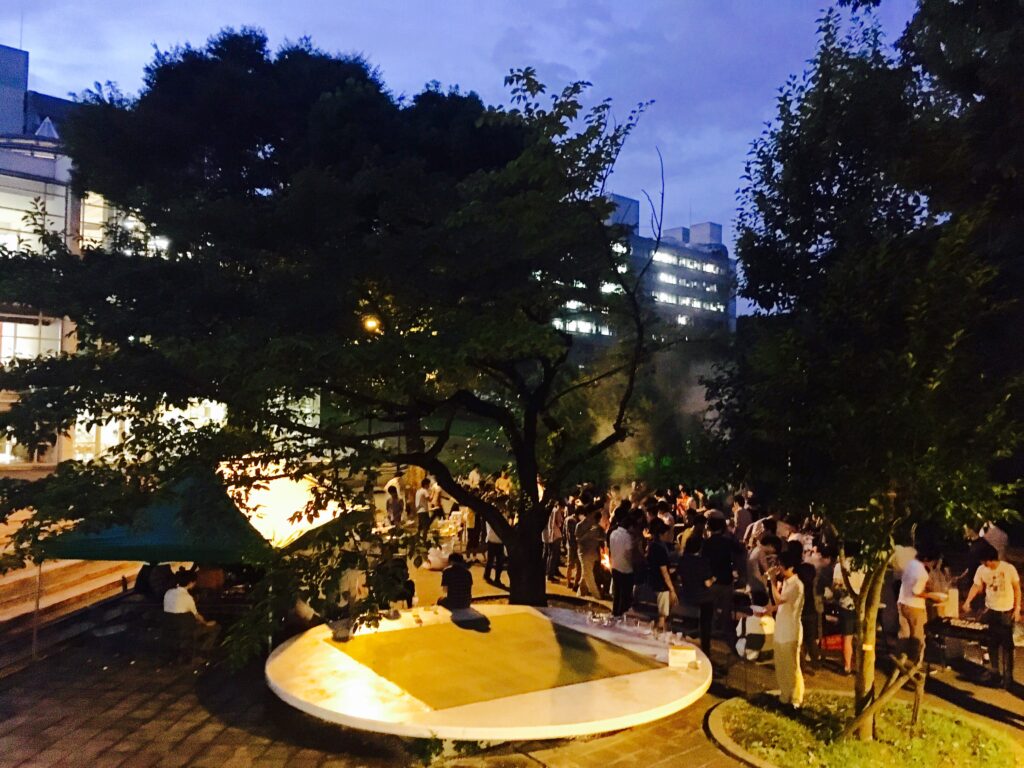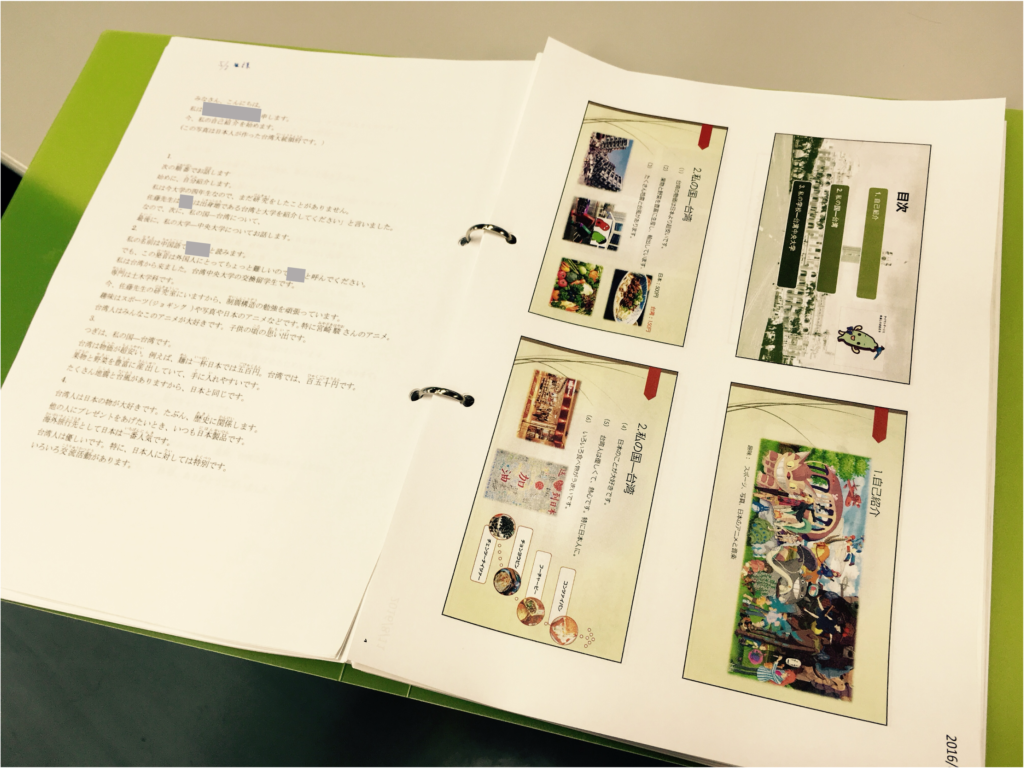
This article is part of theCh3: Life in a Research Laboratory"Part 6 of the series
Academics and Socialization
- ①Welcome to the New Student Training and Research Laboratory
- ②Classroom, Zoom, and Club Presentation
Leisure & Entertainment
Social Culture
- ⑥ BBQ Party under the Cherry Blossom Tree ← Current location
- (7) Architecture Department Basketball Tournament Incident
- (8) Rituals of the New Year's Eve Party and Drinking Party
Highlights of this article
- The Social Meaning and Importance of the Japanese Drinking Culture
- A Complete Guide to Japanese Dining Etiquette (Chopsticks Taboo, Taiwan-Japan Differences)
- The Real Experience and Social Strategies of BBQ Party under the Cherry Blossom Tree
- "Cultural Observations on "Meeting Friends with Wine" and "Strengthening Courage through Wine
- The Importance of Japanese Communication in Social Networking (English vs Japanese)
- Social Skills for the Seat Replacement
- Frequently Asked Questions (FAQ)
- Guided Reading and Reading Suggestions
- In-depth analysis of Japanese drinking culture
- 🍽️ The Complete Guide to Japanese Dining Etiquette
- Japanese Chopsticks Etiquette
- BBQ under the Cherry Blossom Tree
- VI. CONCLUSION
- Frequently Asked Questions (FAQ) for Readers
- Related Resources
- Read Next
Guided Reading and Reading Suggestions
This post is about my experience at the BBQ under the cherry blossom tree at TUT. If you are going to study or work in Japan, this article will help you:
✅ Understanding the culture of Japanese Sake(Why do Japanese people need alcohol to socialize?)
✅ Mastering Japanese Dining Etiquette(Chopsticks Taboo, Chewing with Mouth Closed, Tae-il Differences)
✅ Learn Social Strategies("To meet friends with wine, to strengthen courage through wine".)
✅ Recognizing the importance of Japanese in social situations("The Bridge of Minds)
✅ Avoiding Common Mistakes(Don't help others with food, don't use chopsticks to stab food)
It is recommended to read the Quick Checklist first, then read the cultural background, and finally refer to the FAQ for answers to frequently asked questions.
Quick Checklist (must read before attending a Japanese party)
- 📋 Pre-departure mental preparation
- Understanding Japanese drinking culture (not just drinking, but also social occasions)
- Learning basic dining etiquette (chopsticks taboo, chewing with mouth closed)
- Preparing for Self-Introduction (Japanese version)
- Acknowledge your alcohol tolerance (you can skip a drink, but politely decline)
- Prepare business card or LINE ID (for easy exchange of contacts)
- 📋 Notes for the day of the party
- Arrive 5-10 minutes early (punctuality is important)
- Active greeting (よろしくお願いします)
- Observe how other people eat (especially chopstick use)
- Don't just talk to people you know (initiate conversations with strangers)
- Timely "seat replacement" (change positions to increase communication opportunities)
- Don't drink excessively (stay sober and make a good impression)
- 📋 Dining Etiquette Review
- Chopsticks not inserted in the rice (立て箸,佛筷)
- Pointing to people or objects without chopsticks (指し箸,指筷子)
- Passing food to others without chopsticks (箸渡し, chopsticks pass chopsticks)
- Chewing with mouth closed (no sound)
- Pick up your bowl and eat (don't put it on the table)
- Don't help others with their food (Japanese cultural taboo)
- Keep your elbows off the table (maintain good posture)
- 📋 After the meeting
- Volunteer to help clean up (show teamwork)
- Exchanging contact information with new friends
- Send a message of thanks the next day ("Yesterday was a day of thanks").
- Organize business cards or contact information (networking)
In-depth analysis of Japanese drinking culture
🍶 Why do Japanese people need 'alcohol' to socialize?
In Japan.Cocktail party(A common form of socializing is the "drinking club" (みかい). The main reason is that many Japanese people are shy and don't always express their true feelings, so they need alcohol as a truth-teller to help them let go of their inhibitions and communicate with each other.
🍺Cultural background of Japanese drinking societies
The following is the cultural background of the Japanese Sake Festival:
| Cultural Characteristics | Description |
|---|---|
| Bon-Yin and Chien-Chien Chien | In public, Japanese people will show "Kenzen" (superficial speech), but after drinking, they will say "Honin" (sincere speech). |
| Class Break | Drinks can temporarily break down relationships and improve communication. |
| Team Cohesion | Enhance team spirit and sense of belonging through alcohol consumption. |
| Intelligence Exchange | Easier to exchange information and ideas in informal settings |
| Interpersonal Establishment | Cocktail parties are a great place to network. |
🤔 What are the "honky tonks" and "build-aheads"?
This is a key concept in understanding Japanese culture:
| conceptual | Japanese Pronunciation | significance | Usage Scenarios |
|---|---|---|---|
| before the establishment of sth. | Tatemae | Superficiality, superficiality, and official statements. | Formal occasions, work occasions, first-time meetings |
| native speaker (esp. in Chinese grammar) | Homunculus | True thoughts, heartfelt words | Private occasions, cocktail parties, intimate friends |
Here is an example to illustrate:
Scene: A supervisor asks a subordinate, "Is it okay to work overtime?"
Pre-construction (surface talk)"Haha, a great man!" (Okay, no problem!)
Bento (real idea): "I would like to return home, but..."
Functions of a drinking party: To allow Japanese people to speak their "native language" in a relaxed atmosphere and to build real human relationships.
🇹🇼 vs 🇯🇵 Difference in Drinking Cultures between Taiwan and Japan (based on personal experience)
| Project | Japanese Drinking Club | Taiwan Potluck |
|---|---|---|
| goal | Socializing, speaking from the heart, building relationships | Eating, chatting and bonding |
| Alcohol Role | Core (almost mandatory) | Optional (drinkable or not) |
| Seating Arrangement | There is a hierarchical order (superior, inferior) | More casual |
| Toast Culture | Very important (requires an active toast) | More casual |
| Conversation | Work, Research, Life Planning | Lighter, Gossip, Entertainment, Life |
| End Time | Usually later (22:00-24:00) | More flexible |
| Second Meeting | Common (1st meeting → 2nd meeting → 3rd meeting) | Less common |
💡 Highlights: In Japan, a drinking party is more than just a "drink"; it's a "socializing tool". Even if you don't drink, attending a party is an important way to build relationships.
🍽️ The Complete Guide to Japanese Dining Etiquette
Common Errors
Taiwanese people are most likely to make the following mistakes when dining in Japan. These mistakes may be common in Taiwan, but they are considered rude in Japan:
Error 1: Chewing with mouth open (×) → Chewing with mouth closed (○)
Taiwan Habits: Many Taiwanese are accustomed to chewing with their mouths open, making a "popping, popping" sound.
Japanese EtiquetteYou must chew with your mouth shut and eat quietly.
Why do Japanese people chew with their mouths shut?
| rationale | Description |
|---|---|
| Eating Problems | When you open your mouth to eat, the people on the other side of the table can easily see the food in your mouth and you will be regarded as a bad-looking person. |
| Noise problem | When eating with mouth open, it is easy to make chewing noises, which makes people around you or neighbors feel noisy |
💡 be an exception: When you eat ramen, you can make a "sucking" sound, which is a sign of good taste. However, you still need to keep your mouth closed while chewing.
Error 2: Helping others with food (×) → Not helping others with food (○)
Taiwan Habits: When family or friends get together, will kindly help others to share the food.
Japanese EtiquetteDon't do that!
Why can't Japanese people help others with their food?
| rationale | Description |
|---|---|
| Health Considerations | Using your own chopsticks to give food to others will make them feel unhygienic. |
| Personal space | Japanese people value their personal space and don't like people interfering with their choices. |
| serving chopsticks culture | In Japan, there is a culture of serving chopsticks (取り箸, とりばし), which are used to serve communal dishes. |
💡 Proper Practice: If you want to share food, say "This is delicious. Let the other person pick it up.
remind you again
The following two points, I feel the need to remind the place, perhaps everyone's family name is different, there will be different eating habits, but the following two points need to pay attention to.
Reminder 1: Elbows on the table (×) → Elbows off the table (○)
Taiwan Habits: Your elbows may naturally rest on the table when you eat.
Japanese Etiquette: Elbows should not be resting on the table when eating.
Why can't Japanese people elbow their way to the top of the table?
| rationale | Description |
|---|---|
| Health Considerations | Elbows on the table can lead to stooping, which puts pressure on the stomach and hinders digestion. |
| Liturgical Considerations | For Japanese, such behavior shows that you are not interested in or do not want to face the food, the person preparing it, or the people at your table. |
Reminder 2: Bowls are put on the table for eating (×) → Rice bowls must be picked up (○)
Taiwan Habits: Many Taiwanese are used to putting their bowls on the table and eating with their heads down.
Japanese EtiquetteRice and soup bowls must be picked up and eaten.
Why do Japanese people pick up their bowls and eat?
| rationale | Description |
|---|---|
| Liturgical Traditions | It is traditional Japanese etiquette to pick up the bowl and eat, showing respect for the food. |
| Eat beautifully | Eating with your head down makes you look bad. |
| The dog food law | In Japan, there is a saying "Inuyasha" (いぬぐい), which describes putting the bowl on the table and eating with the head down like a dog. |
💡 take note of: Large plates (e.g. curry rice, fixed entrees) do not need to be picked up; only small bowls (rice bowls, soup bowls) need to be picked up.
Japanese Chopsticks Etiquette
In Japan, the etiquette of using chopsticks is very strict. The following is an introduction 17 Taboo ChopsticksThe division is:
- Taboos shared by Taiwan and Japan(8 types): Taiwan and Japan should be avoided.
- Japan-specific taboos(9 types): Special to be avoided in Japan
🥢 Taiwanese-Japanese Taboos (8 types)
These chopsticks are considered impolite in both Taiwan and Japan:
1. Tatebashi
Chinese: 佛筷
- behavior: Stick the chopsticks vertically into the rice
- Why not?
- This is the way to make offerings to Buddha and ancestors.
- It reminds people of death, funerals.
- It's extremely bad luck.
- Proper Practice: Place chopsticks flat on a chopstick rack or horizontally on a bowl.
2. Moyoiwaishi (まよいばし)
Chinese:pick up chopsticks
- behavior: Wandering over the table with chopsticks, unsure of what to eat.
- Why not?
- Appears hesitant and impolite.
- Making it look like you're unhappy with the food and upsetting the person who prepared it.
- Proper PracticeDecide what you want to eat before you pick up your chopsticks.
3. Saguri-bashi (さぐりばし)
Chinese:chopsticks
- behavior: Use chopsticks to stir the food in the soup bowl or dish to find your favorite food.
- Why not?
- Messing up the dishes and affecting other people's access to the dishes
- It's a bad idea to pick only what you like.
- Proper Practice: Start clamping from the top without stirring.
4. Watashi-bashi (わたしばし)
Chinese: serving chopsticks
- behavior: Pointing chopsticks at someone or something
- Why not?
- I feel like I'm blaming someone else.
- Very impolite and offensive.
- Proper Practice: finger pointing, or describing in words
5. 涙箸 (なみだばし)
Chinese: chopsticks in tears
- behavior: The soup drips off the chopsticks and goes straight into your mouth!
- Why not?
- Stains tables and other dishes
- Appears unsightly and makes people at the table uncomfortable
- Proper Practice: Catch the soup in a small dish or with your other hand.
6. 叩き箸(たきばし)
Chinese:chopsticks
- behavior: Making a sound by striking chopsticks on a piece of cutlery, or calling out to someone with that sound
- Why not?
- In Japan, there is a superstition that "bowling for hungry ghosts" will attract evil spirits.
- Can damage dishes and can be noisy
- Proper Practice: Calling out to others with words or gestures
7. Lipstick (neburi-bashi)
Chinese:lick the chopsticks
- behavior: Lick the chopsticks with your tongue
- Why not?
- It's not very educated.
- It's very unsightly and makes the people at the table feel sick.
- Proper Practice: Wipe chopsticks with a napkin or paper towel
8. 噛み箸 (かみばし)/
Chinese:bite the chopsticks
- behavior: Biting the tips of chopsticks
- Why not?
- Chopsticks will be damaged
- It's very rude.
- Proper Practice: Relax and use chopsticks properly
🇯🇵 Japanese Taboos (9 types)
These chopsticks are particularly important to avoid in Japan and are closely related to Japanese culture and customs:
1. Chigiribashi (ちぎりばし)
Chinese: Chopsticks
- behavior: Hold a chopstick in each hand and cut the food like a knife and fork.
- Why not?::
- It's very uneducated.
- You should use chopsticks to pick up the food and then bite it off with your mouth.
- Proper Practice: Pick up the food with chopsticks, if it is too big, use your mouth to bite it off, or use chopsticks to tear it apart.
2. Sticky (Hashwatashi)
Chinese: Chopsticks
- behavior: Transferring food directly from one pair of chopsticks to another pair of chopsticks
- Why not?::
- In Japan, after cremation, family members will pick up the ashes with chopsticks and pass them from one pair of chopsticks to another.
- It reminds people of death, funerals.
- Proper Practice: Place the food on a plate and let the person pick it up.
3. Sashibashi (刺し箸)
Chinese: Chopsticks
- behavior: Pierce food with chopsticks
- Why not?
- It looks like they're checking to see if the food is cooked.
- Apparently there's a mistrust of food.
- Proper Practice: Using chopsticks to pick up food
💡 be an exception: Some special foods (e.g. Konjac cooked in Kanto) can be extracted by pricking with a toothpick, but not with chopsticks.
4. Watashi-bashi (わたしばし)
Chinese: Bowl on Chopsticks
- behavior: Place the used chopsticks horizontally on a bowl or plate.
- Why not?
- It means "I don't need it anymore" and "I'm full" in Japanese.
- If you are still in the middle of your meal, the waiter will think you are finished.
- Proper Practice::
- mealtime: Place chopsticks on a chopstick rack
- End of meal: Place the chopsticks horizontally on a bowl or chopstick bag.
5. Yosebashi (寄せ箸)
Chinese: Chopsticks
- behavior: Use chopsticks to pull the plate or bowl closer to yourself
- Why not?::
- He's lazy and uneducated.
- You should use your hands to pick up utensils
- Proper Practice: Move the plate or bowl by hand to an easily accessible location.
6. Mochebashi (もちばし)
Chinese: same hand chopsticks
- behavior: Use the same hand that holds the chopsticks to hold the utensils
- Why not?
- Unelegant and unsteady movements.
- Easily spilled or dropped
- Proper Practice: put down chopsticks → pick up cutlery with one hand or switch chopsticks to the other hand
7. Accepted art (うけばし)
Chinese: Chopsticks
- behavior: Use chopsticks as spoons to catch soup or sauce dripping from the side of your mouth.
- Why not?::
- It's not pretty.
- Should be caught on a small plate or napkin
- Proper Practice: Catch the soup in a small saucer or hold it in your other hand.
8. Seseri art (せせりばし)
Chinese: Chopsticks
- behavior: Picking teeth with chopsticks
- Why not?::
- Very unhygienic and unsightly
- Damage to chopsticks
- It makes the people at the table sick.
- Proper Practice: Flossing with toothpicks, preferably in the restroom.
9. Sakazabashi (さかさばし)
Chinese: 顛倒筷
- behavior: Use chopsticks in the opposite direction (use the end to hold the food) when taking food from a public dish.
- Why not?
- While it's a good thing to do (to avoid drooling on the communal dishes), it's the wrong thing to do in Japan!
- The end of the chopsticks is where the hands are held, there may be hand sweat and bacteria
- Proper Practice::
- use disposable chopsticks(Fetch Art)
- If there are no chopsticks, ask politely if you can use your own chopsticks.
💡 Cultural Observations: Taiwanese people often use "inverted chopsticks" to show courtesy, but this is wrong in Japan! Be sure to remember that.
📊 Complete comparison table of forbidden chopsticks
| Chopsticks | Japanese (language) | behavior | Taiwan-Japan Common | Japan-specific | Severity |
|---|---|---|---|---|---|
| chopsticks | Literature | Chopsticks in rice | ✅ | – | ⭐⭐⭐⭐⭐ |
| chopsticks | 箸渡し | Chopsticks spreading food | – | ✅ | ⭐⭐⭐⭐⭐ |
| pick up chopsticks | Enchanted Art | Chopsticks wandering | ✅ | – | ⭐⭐⭐⭐⭐⭐⭐ |
| chopsticks | Art | Chopsticks to stir the dish | ✅ | – | ⭐⭐⭐⭐⭐⭐⭐⭐ |
| chopsticks | Fingerprints | chopsticks pointing at people | ✅ | – | ⭐⭐⭐⭐ |
| chopsticks in tears | The art of art. | Soup Drops | ✅ | – | ⭐⭐⭐⭐⭐⭐⭐ |
| chopsticks | Kikki Art | Chopsticks on Cutlery | ✅ | – | ⭐⭐⭐⭐ |
| lick the chopsticks | Licking Art | Lick the chopsticks. | ✅ | – | ⭐⭐⭐⭐⭐⭐⭐⭐ |
| bite the chopsticks | Art | bite the chopsticks | ✅ | – | ⭐⭐⭐⭐⭐⭐⭐ |
| chopsticks | Chigiri Art | Cutting food with both hands | – | ✅ | ⭐⭐⭐⭐⭐⭐⭐⭐ |
| chopsticks | Stabilizing Art | Chopsticks stabbing food | – | ✅ | ⭐⭐⭐⭐⭐⭐⭐⭐ |
| serving chopsticks | WATSHI | Chopsticks on the bowl. | – | ✅ | ⭐⭐⭐⭐⭐⭐⭐ |
| chopsticks | Sessions | Chopsticks Pulling Plate | – | ✅ | ⭐⭐⭐⭐⭐⭐⭐⭐ |
| serving chopsticks | Chibashi | serve the same hand with chopsticks (idiom); to join hands and chopsticks | – | ✅ | ⭐⭐⭐⭐⭐⭐⭐ |
| serve chopsticks | Subjected to chopsticks | Chopsticks to catch the soup | – | ✅ | ⭐⭐⭐⭐⭐⭐⭐ |
| chopsticks | Seseri Art | pick one's teeth with chopsticks | – | ✅ | ⭐⭐⭐⭐ |
| chopsticks inverted | Counterstrategy | Use your chopsticks the other way around. | – | ✅ | ⭐⭐⭐⭐⭐⭐⭐⭐ |
💡 Memory Tips::
- Most SeriousChopsticks: Buddha's Chopsticks, Chopsticks to Chopsticks (associated with death)
- It's serious.Knocking on the chopsticks, pointing at the chopsticks, picking the teeth of the chopsticks (in an uneducated manner).
- More serious: Probing, slicing, stabbing, pulling and reversing chopsticks (incorrect usage).
- light: Pick the chopsticks, tear the chopsticks, bite the chopsticks, serve the chopsticks, serve the chopsticks with the same hand, catch the chopsticks (indecent).
💡 Chopsticks Etiquette Summary
As mentioned above, there are interesting differences in etiquette between Japan and Taiwan, which are also in the chopstick culture circle. Many Japanese people observe the way they eat and their manners when they first meet each other, so when you go out with Japanese people, pay attention to the above points and you will have a better chance of making friends.
BBQ under the Cherry Blossom Tree
Students in the Suzukake-dai (Suzuka-dai) campus of Tohoku University (formerly TUT) often hold BBQs, especially in the spring and fall when new students enter the campus. At these BBQs, I learned a lot about Japanese dining culture and realized the charm of "meeting friends over sake".

📖 Story 1: Being corrected by a senior on how to use chopsticks
I'm using chopsticks to slice up the roasted meat to put on a plate for everyone to take.
Mr. Yamada (approaching)"Zero-kun, wait."
Me (doubtful)"What's wrong?"
Mr. Yamada (polite but serious)"In Japan, it's impolite to share meat with a chopstick in each hand."
Me."Huh? Why?"
Mr. Yamada"Because you're using chopsticks to cut up the food, it's called "chigiri-shibashi" (chopsticks cutting) in Japan, and it's a taboo."
Me (in a moment of realization): "I see! What should we do?"
Mr. Yamada: "You should use chopsticks to pick up the meat and then use another pair of chopsticks to tear it apart, or just cut it with kitchen scissors."
After that, Mr. Yamada shared with me a lot of etiquette and rules for using chopsticks. At that moment I realized thatThere's so much to learn about chopsticks.!
My feelings::
"Although it was a little awkward at first, I learned a lot from Mr. Yamada's reminder. He didn't say it in a scolding tone, but shared it with me in a way that made me feel warm and fuzzy. It also helped me to pay more attention to Japanese dining etiquette and to avoid making the same mistake again."
📖 Story 2: Echoes of the First Japanese Report
I continued to stand by the grill, preparing skewers for the seniors. A student I don't know comes over to talk to me.
Strange senior (enthusiastic)"Zero, right?"
Me."Yes, hello."
Strange senior (excited): "Your report was superb! I'm very impressed with you! Isn't Taiwan so beautiful? How long have you been in Japan?"
Me (confused)"Report? You mean... ah!"
I snapped back to the classroom report.
(Into Memory: Japanese report from a building dynamics class)
In my building dynamics class, the teacher asked us to share our research. Since I was a senior in college and did not have a thesis, the teacher asked me to introduce my country and school.
Teacher (considerate)"In English or Japanese."
Considering that my Japanese is not good enough, I hesitated for a while, but decided to Introducing Taiwan in Japaneseso that people can really listen to it.
My preparation process (using three days of vacation)::
- Flipping through grammar books, searching for the best words.
- Make a slide show and ask the seniors to help me edit it.
- Practice with the projector in the lab.
On the day of the presentation, I was so nervous that I was worried that I would say the wrong thing, make grammatical mistakes, or have a bad pronunciation. However, when I finished my presentation fluently, there was a round of applause from the stage, and my sisters were amazed at my progress and expressed their compliments one after another.
At that moment, I felt The Joy of Being Recognized for Your EffortsThe

(pulls back to BBQ venue)
Me (humble)"Really? Thank you. It's only been a month, so I still suck at Japanese! It's only been a month, so I still suck at Japanese and I don't understand a lot of it..."
Strange senior. (SURPRISE)I thought you'd been here for at least six months! I thought you'd been here at least six months... you're fluent!"
Afterwards, we had a very happy chat. We talked about the night market in Taiwan, the 101 building, the beach in Kenting, the scenery in Jiufen... He was full of curiosity and longing for Taiwan.
As he had to go to the professor for a toast, he said to me, slightly drunk, before he left:
Strange senior (slightly inebriated)I'd like to add you to my Facebook page. I'm going to Taiwan, and I'm going to need a lot of help! I've decided to go to Taiwan after reading your introduction."
Me (open heart)"Thank you for chatting with me. Remember to tell me when you come to Taiwan."
Strange student (before leaving)"By the way, here's a tip: the better your Japanese, the prettier your Japanese girlfriend will be."
Before he left, he left these words which had a profound impact on me.
My feelings::
"This conversation has made me realize.Even though there is little communication in class, we are all observing each other in silence.And the relaxed atmosphere of a drinking party allows Japanese people to let themselves go and talk about everything. And the relaxed atmosphere of a drinking party allows Japanese people to open themselves up, talk about things, and build real friendships."
📖 Story 3: The first time I asked for LINE, I was emboldened by alcohol.
As I continued to stand by the grill, preparing skewers for the seniors, a girl stood by.
I'm (politely handing over a skewer)"Want one?"
Girl (smiling)"May I? Thank you."
Girl (initiating conversation)"You're Sato-ken's Zero-kun, aren't you?"
Me (Memory)"Yes, I think you're from Kishiki-ken? I see that you occasionally come to our research lab to see Wada-san and Nakata-san."
Girls (hot)I've been to Taiwan three times and I love it! Your report is great. I've been to Taiwan three times and I love it."
Me.: "This is the first time I've heard someone say they've been to Taiwan, it's wonderful!
Girl (gushing)"I can't get tired of eating Taiwan 101's vibrating balls, the scenery of Jiufen, and the shaved ice at the night market!
GIRL (eyes glowing): "And you like Hayao Miyazaki, right? I heard you say in your report that I like the same thing as you, that I'm a big fan of the Invisible Girl!"
As we chatted, I realized that she was from Kyoto, just like Mr. Murata, so it's no wonder that she spoke with a special sense of intimacy.
Twist: Speaking faster than you can keep up with the conversation.
In the middle of the lesson, I was joined by other students, and I started to lose the conversation because the speed of the Japanese language had doubled. As I was sighing that I needed to improve my Japanese, the other student seemed to realize that I couldn't keep up.
Girls (for other seniors)"I'm going to have a drink first." (That's what's called "せきがえ(せきがえ、中文:换位置)" )
Girl (greeting me)"Zero, come on."
Before I could read the situation, I followed her aside.
A Conversation Between Two People: From Experiments to Hayao Miyazaki
Afterwards, each of us poured a glass of wine and talked about how the experiments were going and so on. As expected, there was no escaping from the topic of the University's internal affairs:
Assignments, Labs, Reports, Seminars
But although the vocabulary was not yet extensive, the I can understand Japanese for professional purposes.I'm sorry, but I'm not sure if I can still talk to you.
What we talked about::
- Progress of experiments, requirements of professors, preparation for seminars
- Differences in Research Environments between Taiwan and Japan
- Miyazaki Hayao's Animation
- Cuisine and Attractions in Taiwan
In a flash, the BBQ will soon come to an end.
Drinking to Strengthen Courage: The First Time in My Life I Asked a Strange Girl for LINE
Me. (Gathering courage)I'll be your tour guide next time you come to Taiwan.
Girls (open): "Really? It's great! I don't have my cell phone, so I'll give you my ID."
Leave me your ID when you're done.
Girl (preparing to leave)"If you can't, come see me in my lab."
After that, she ran back to the lab to write her report.
Come to your senses...
Looking at her back, he snapped back to his senses and suddenly felt so crazy.With the power of alcohol, the first time I asked a strange girl for LINE.!
My feelings::
"It was at that moment that I truly realized why most Japanese people love to drink so much. Alcohol allows introverted Japanese (and me) to let go of our inhibitions and express our true feelings. This experience also helped me to better understand the Japanese social culture."
💡 BBQ Experience Summary
After a few BBQ meetings, I realized one thing:
"For Japanese people, English shows professional competence, while Japanese is the bridge between the heart and the mind."
After all, human beings choose the language of habit to reveal what they are really thinking. I'm glad I chose to train myself in Japanese, not only did I make new friends, but I also got to know more people in Taiwan.
VI. CONCLUSION
The BBQ under the cherry blossom tree was one of the most unforgettable experiences of my study abroad life. From being corrected by my seniors on how to use chopsticks, to the repercussions of my first Japanese presentation, to the conversation with friends over drinks, to the courage to go to the LINE over a drink, every moment made me realize that I am a student in Japan. The Unique Charm of Japanese Social CultureThe
I learned from this experience:
✅ Dining etiquette is importantChewing with mouth closed, elbows off the table, bowl up, not helping others with their food
✅ Chopsticks etiquette: Avoid the 17 forbidden chopsticks, especially the "Buddha Chopsticks" and "Chopsticks to Chopsticks"!
✅ Drinking is the key to socializingAlcohol makes the Japanese drop their inhibitions and speak from the heart.
✅ Japanese is a bridge of the heartEnglish for Professionalism, Japanese for Friendship
✅ It's important to try.: Even if your Japanese is not good, you should be brave enough to communicate in Japanese.
If you are going to study in Japan, I highly recommend it:
Attend more social events such as cocktail parties and BBQs!
Frequently Asked Questions (FAQ) for Readers
- QWhat is the most important etiquette to be aware of when dining in Japan?
- A
Taiwanese people need more attention:
- Shut up and chew.(Don't open your mouth to eat or make noise)
- Keep your elbows off the table.("Keep your elbows off the table while you eat.)
- Pick up your bowl.(Don't eat with your bowl on the table.)
- I don't help people with their food.(It's not customary in Japan.)
💡 If you remember these four points, you basically won't make a big mistake!
- QWhat is the most serious chopstick taboo?
- A
The following two are the most serious contraindications:
- Tate chopsticksChopsticks in rice (a highly inauspicious way of making offerings to the Buddha)
- ChopsticksChopsticks: Chopsticks used to pass food to others (cremation ceremony action, extremely unlucky)
💡 These two taboos are related to death and must not be violated!
- QCan I use "Upside Down Chopsticks" in Japan?
- A
No can do!
- Taiwanese people often use "inverted chopsticks" to show courtesy (to avoid drooling on public food).
- However, in Japan, the end of the chopsticks is where the hand holds them, so there may be hand sweat and bacteria, which makes it even more unhygienic.
Proper Practice::
- Use of chopsticks
- If there are no chopsticks, ask politely if you can use your own chopsticks.
- QDo I have to drink alcohol for a Japanese drinking party?
- A
Not necessarily, but it is recommended to drink at least a little:
- If you don't drink at all, you may be considered "out of touch"
- Can drink small amounts of alcohol or choose low alcohol drinks (e.g., shava, plum wine)
- If you really can't drink, you can say "お酒が飲めないんです"(我不能喝酒).
Toast::
- Pour for others before you let them pour for you.
- Say "Cheers" when making a toast.
- You can say "yummy" after drinking it.
- QHow to initiate conversation at a cocktail party?
- A
Here are practical tips:
- opening remarks
- "初めまして、〇〇です。 よろしくお願いします。" (First time meeting, this is ○○, please teach me more)
- "I'm very tired. Cheers!" (Let's drink up!)
- Topic Selection
- Research or Work
- Hobbies and Interests
- Recent life
- Differences between Taiwan and Japan
- End of conversation
- "LINE exchange? (Can I exchange LINE?)
- "「席替えしますね」"I'm switching places.
- opening remarks
- QCan I join the party if I don't speak Japanese well?
- A
It's okay! And it should be!
- rationale
- Drinking is the perfect opportunity to practice Japanese.
- Relaxed atmosphere makes it less stressful.
- Japanese people slow down their speech and simplify their words when they drink.
- You can experience Japanese culture even if you don't understand it.
- Recommendation
- If you don't understand, you can say "もう一度お願いします"(Please say it again).
- Prepare a few topics in advance
- Prepare a self-introduction (short and clear)
- Don't be afraid to say the wrong thing. Just say it.
- rationale
- QHow to Make a Good Impression at a Cocktail Party
- A
Here are practical tips:
- Meals
- Observe dining etiquette (chewing with mouth closed, proper use of chopsticks)
- Eat elegantly and move steadily
- Toast.
- Offer to pour for others.
- Make eye contact and smile during the toast
- Raise your glass to the level of your eyes when you say "Cheers".
- In conversation
- Listening to what the other person has to say
- Timely response (e.g. "そうですね"、"なるほど")
- Ask questions to show interest (e.g. "それは面白いですね!")
- When you leave.
- Thanks to the organizers
- Saying goodbye to someone you know
- Exchange Contact
- Meals
- QWhat are some of the socializing opportunities other than cocktail parties?
- A
A common social event in Japanese research laboratories:
Events Japanese (language) frequency distinctiveness Cocktail party Drinking Club 1-2 times per month Formal social occasions BBQ Barbie 1-2 times each in spring and fall Relaxing Outdoor Activities See you soon. See you soon. March-April each year Cherry blossom viewing party Forgetting the Years New Year's Eve party December each year Year-end party Seminars seminar unscheduled Academic Exchange put up a hotel room together put up a hotel room together 1-2 times per year Group accommodation, team building
Related Resources
- Art Culture and History Stick Mana and Tubes (Smoking Sticks)
- Know the art of Mana! The way to set up your artwork
- The child's elbow is straightened out during the meal! Unexpected Reasons and Countermeasures
- Do you have any questions regarding the atmosphere of the Mana at the food table?
- Chewing sound is not a funk! Tone on Tatakunai no funk?
Read Next
Let's go, let's read the next one!
Want a little refresher on the last one?
Or go back to the EP1 catalog for a different story?



Message Center Feedback